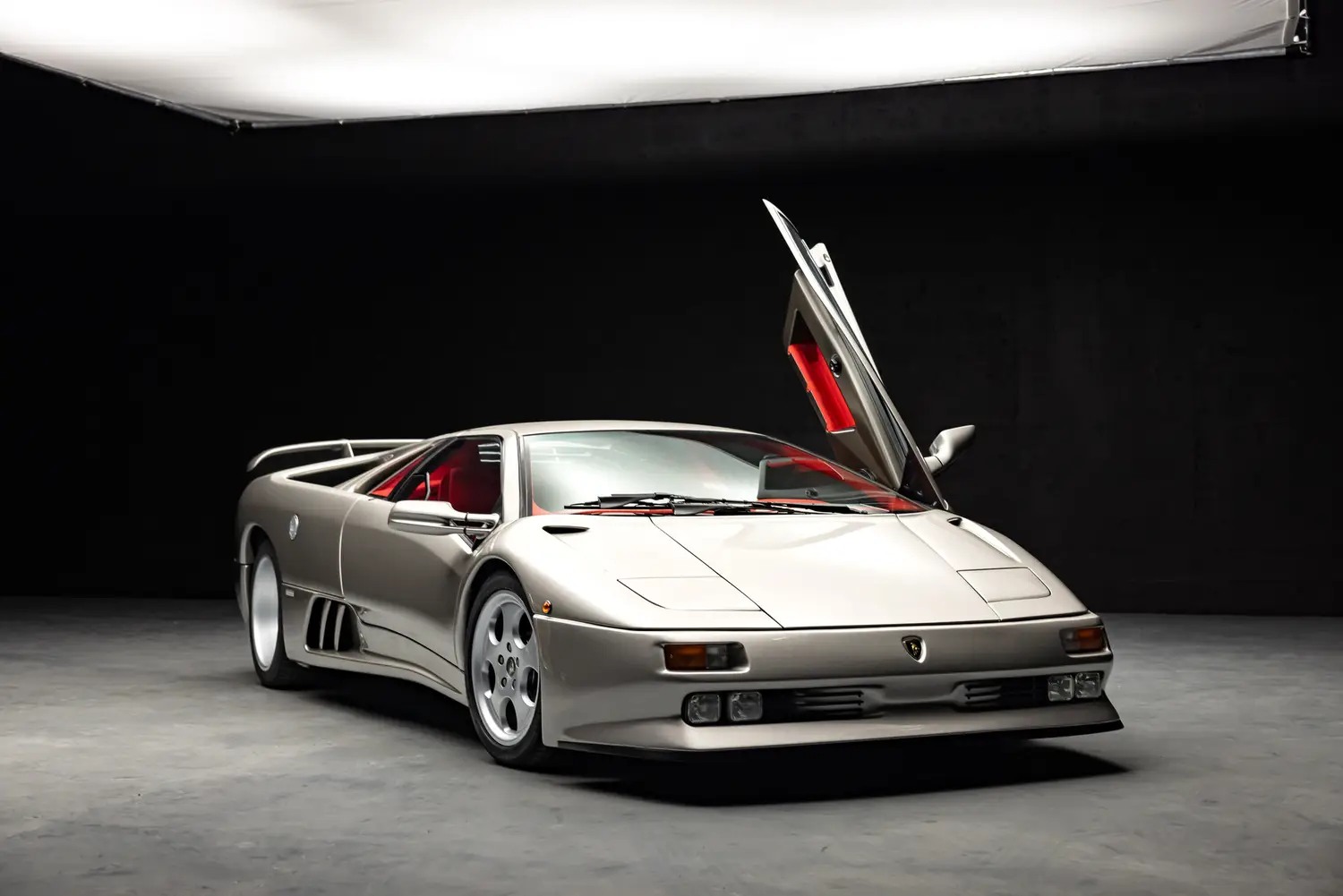1995 Lamborghini Diablo SE30
Concours Level Restoration
Concours Level Restoration
European Car with Red Alcantara
Year
1995
Brand
Lamborghini
Model Variant
Diablo SE30
Current Mileage
39,500 km


chasis
ZA9DE22A0RLA12049
Engine capacity
5.7L, 4-valve, V12 / 525BHP
exterior color
Argento
Interior color
Red Alcantara
transmisSion
Five Speed Manual
Top speed
207MPH
Designer
Tom Gale at Chrysler Styling Center
Years produced
1995 -
Total production
150
More details
Third in line in Lamborghini's supercar sequence, following the Miura and Countach, the Diablo represented a fresh direction for the brand. Launched in 1990, the Diablo marked the end of the Countach's sixteen-year reign and remained in production until 2001, navigating through financial turbulence and ownership changes.
The design of the Diablo began in 1985 under Project 132, led by Marcello Gandini, the mastermind behind the Miura and Countach. Initially contracted by Lamborghini financiers Jean Claude and Patrick Mimran, Gandini's design underwent significant revisions after Chrysler acquired Lamborghini in 1987. Chrysler's design team in Detroit softened Gandini's aggressive edges, resulting in a car that retained Lamborghini's distinctiveness without being as radical as Gandini had envisioned. The final design, while refined, still featured the signature scissor doors but departed from the Countach’s aesthetics.
Lamborghini, under Chrysler’s guidance, aimed to create a 200 MPH supercar to compete with the Ferrari F40, Jaguar XJ220, and the McLaren F1. The Diablo achieved this with its powerful V12 engine and advanced aerodynamics, ensuring it could hold its own against these formidable competitors.
In 1994, to commemorate Lamborghini’s 30th anniversary, the Diablo SE30 was introduced as a limited-production model, emphasizing performance and weight reduction. The SE30's power was boosted to 523 BHP with enhancements such as a tuned fuel system, free-flowing exhaust, and magnesium intake manifolds. It featured manual adjustable anti-roll bars instead of the VT model's electronic shocks, and weight-saving measures included fixed plexiglass windows with small sliding vents, replacing the standard power glass windows. Luxuries like air conditioning, stereo, and power steering were omitted, while carbon fiber seats with four-point harnesses were added.
The SE30 also had minor exterior changes from the standard Diablo, including a revised front section, integrated straked brake cooling ducts, and a larger rear wing. The engine bonnet featured slats, and the single fog and backup lamps were repositioned to the bumper. Special magnesium alloy wheels, SE30 badging, and the iconic metallic purple paint (with customization options) distinguished the SE30. Only 150 units were produced, making it a rare and highly sought-after model.
This Lamborghini Diablo SE30 (#2049) is finished in Argento over a Red Alcantara interior. It is a one-of-one specification in that color combination. It underwent a concours-level restoration and is a European specification car.
The design of the Diablo began in 1985 under Project 132, led by Marcello Gandini, the mastermind behind the Miura and Countach. Initially contracted by Lamborghini financiers Jean Claude and Patrick Mimran, Gandini's design underwent significant revisions after Chrysler acquired Lamborghini in 1987. Chrysler's design team in Detroit softened Gandini's aggressive edges, resulting in a car that retained Lamborghini's distinctiveness without being as radical as Gandini had envisioned. The final design, while refined, still featured the signature scissor doors but departed from the Countach’s aesthetics.
Lamborghini, under Chrysler’s guidance, aimed to create a 200 MPH supercar to compete with the Ferrari F40, Jaguar XJ220, and the McLaren F1. The Diablo achieved this with its powerful V12 engine and advanced aerodynamics, ensuring it could hold its own against these formidable competitors.
In 1994, to commemorate Lamborghini’s 30th anniversary, the Diablo SE30 was introduced as a limited-production model, emphasizing performance and weight reduction. The SE30's power was boosted to 523 BHP with enhancements such as a tuned fuel system, free-flowing exhaust, and magnesium intake manifolds. It featured manual adjustable anti-roll bars instead of the VT model's electronic shocks, and weight-saving measures included fixed plexiglass windows with small sliding vents, replacing the standard power glass windows. Luxuries like air conditioning, stereo, and power steering were omitted, while carbon fiber seats with four-point harnesses were added.
The SE30 also had minor exterior changes from the standard Diablo, including a revised front section, integrated straked brake cooling ducts, and a larger rear wing. The engine bonnet featured slats, and the single fog and backup lamps were repositioned to the bumper. Special magnesium alloy wheels, SE30 badging, and the iconic metallic purple paint (with customization options) distinguished the SE30. Only 150 units were produced, making it a rare and highly sought-after model.
This Lamborghini Diablo SE30 (#2049) is finished in Argento over a Red Alcantara interior. It is a one-of-one specification in that color combination. It underwent a concours-level restoration and is a European specification car.
Read more
See less







No items found.





























.webp)